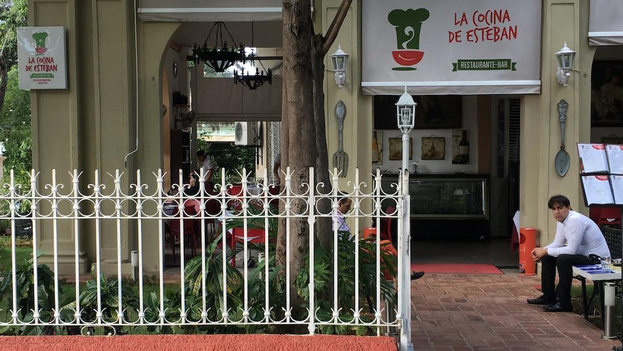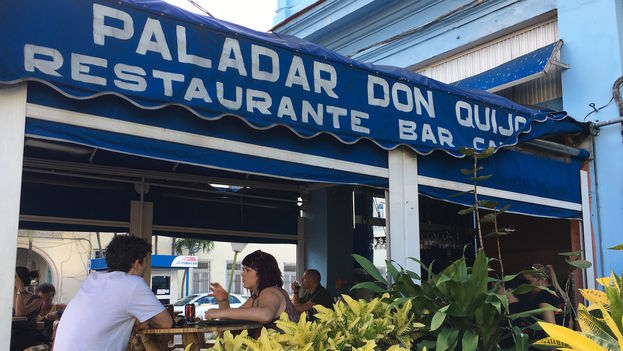
![]() 14ymedio, Luz Escobar, Havana 20 October 2016 — Chinese, Italian or international food fill the menus of Cuban paladares, but lately fear has starred as the main dish on the menu of these private restaurants. The jewel in the crown of entrepreneurship on the island is experiencing moments of uncertainty after the government froze the issuing of licenses for these businesses run by the self-employed.
14ymedio, Luz Escobar, Havana 20 October 2016 — Chinese, Italian or international food fill the menus of Cuban paladares, but lately fear has starred as the main dish on the menu of these private restaurants. The jewel in the crown of entrepreneurship on the island is experiencing moments of uncertainty after the government froze the issuing of licenses for these businesses run by the self-employed.
In recent months food and beverage outlets have watched a parade of pop stars, Hollywood actors, emblematic rock-and-rollers and even US President Barack Obama through their establishments, but it is a complicated time.
Even Camaguey province has been shocked, after the closure, at the beginning of this month, of three of the most important paladares operating in the city. Restaurant 1800 was searched by the police, who confiscated some of the furniture and arrested the owner, Edel Izquierdo. Two other paladares, Mi Hacienda and Papito Rizo’s Horseshoee, were also forced to close.
The suspension in the granting of new licenses for these premises has stoked fears about a possible backward step in the reforms undertaken by Raul Castro starting in 2008. Although officialdom has rushed to clarify that this is a temporary measure, a sense of a country going backwards to times of greater controls is felt on all sides.
The Acting Vice-President of the Provincial Administation in the capital, Isabel Hamze, declared on national television this Wednesday that “of the 135 license holders [of private restaurants] we met with 129 to alert them to a group of problems that cloud the services that they offer and we explained them that, with these exchanges ended, it was time to undertake an inspection.”
The official noted that during several meetings with owners of the private locales they discussed among other issues the consumption and sale of drugs inside restaurants, along with evidence of prostitution and pimping.
Hamze emphasized that those who acquired “money in Cuba or abroad illegally” in order to “bring it to the island and launder it,” need to be on guard. “Nowhere in the world is it legal to launder money and it is not permitted. We are not accusing anyone of doing it, we talked about where their capital comes from,” she said.
“The state can not compete with the privates, which in a short time have managed to run more efficient and attractive places for foreign and domestic customers,” a waiter of the centrally located Doña Eutimia Restaurant, nestled against the Havana Cathedral. The man believes that the current “storm will pass, because otherwise it would go against the times.”
Most owners of these private premises prefer to keep silent. “He who moved doesn’t end up in the photo,” joked a private restaurant owner on 23rd Street. “Everything is on hold, because no one dares to stand out now,” he added. “The repression of the paladares has come because some have become nightclubs with musical programs that attract a lot of people.”
According to updated data, more than 150,000 self-employed work in 201 occupations in Havana. There are more than 500 private restaurants throughout the capital.
In some locations it has become common to alternate good food with shows ranging from comedy, to magic, to fashion. Lately, the celebrated King Bar has sent out invitations to spend October 30, Halloween night, with costumes and frights.
The government undertakes inspections to guarantee strict compliance with the rules that govern the operations of these establishments: no more than 50 seats, limited hours, and the purchase of supplies exclusively in state stores with receipts to prove it.
However, several entrepreneurs consulted by this newspaper agree that it is difficult to manage a private restaurant following the letter of the law. The shortages often experienced in the markets that sell in Cuban convertible pesos, the lack of a wholesale market, and the prohibition against commercial imports, hobble the sector and push owners to the informal market.
In the Labor and Social Security Office on B Street between 21st and 23rd in Havana, this Tuesday, it was not possible to get a license to open a paladar. “The licenses of those who already have them are not suspended,” but “the issuing of new licenses has been halted,” declared an official to the nervous entrepreneurs who came to the site for more information.
The measure was preceded by meetings with the owners of paladares where they were warned to comply with the law; officials from the National Tax Administration Office (ONAT) and the police were at the meetings. The answer has been felt immediately on the menus of the most emblematic places, which have reduced their offerings to what can be purchased in the state retail network.

Lobster and beef have been among the first items to disappear from the menus, as most of these products are purchased on the black market from suppliers who circumvent police roadblocks to bring them to the city.
The law criminalizes very severely the theft and illegal slaughter of cattle – which is nearly all slaughter of cattle outside the state system – in addition to the “illegal abetting” of such goods. Due to the decrease in the number of cattle, to a little more than 4 million today, the Government considers any irregularities in the slaughter and marketing of these animals to be a serious violation of Penal Code.
However, of the 1,700 private restaurants that offer the country has many typical dishes known as ropa vieja and vaca frita, among other dishes made from beef. Given the current onslaught of the authorities, a stealthy slogan is in play: survive and wait out the storm.
